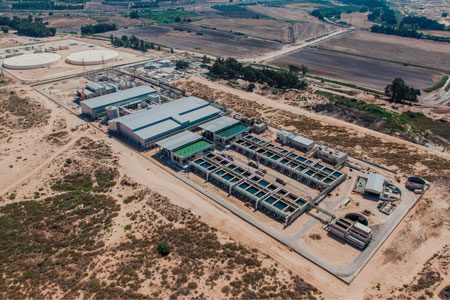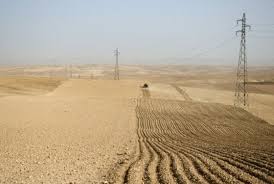
We are undeniably blessed to live in a first-world nation like the United States and it’s not because of the copious amounts of WiFi hotspots and unlimited breadsticks at Olive Garden. Nor is it because of our incomparable military and massive economy. We are the most fortunate population of people to ever exist because of our access to the most important entity life has ever known; water.
It is absolutely intolerable that 660 million people – or 1 in 10 – live without access to clean water in the 21st century. What’s more outrageous is that this number may jump in the coming years with water supplies across the world being in severe jeopardy of vanishing. From Central Africa to Flint, access to water is a basic human right.
However, the sole region that can least afford such an overwhelming crisis is next in line to face one. The Middle East is on the verge of an apocalyptic situation and its only hope is the sole nation in the region not facing acute water stress and whose existence is perpetually denied. After years of continuous conflict, Israel and the Arab nations have the potential to build organic relationships. The nations of the Middle East must put their irrational differences aside and come to grips with the outlook of their region.
With willpower being their greatest resource, the Jewish people transformed a desolate desert into a world-power of thriving agriculture and sprawling cities. Green technology and strong environmental policies propelled the desert state to become one of the greenest nations on the planet. Israel is the global leader in water recycling. Israel recycles 86% of its water with Spain coming in at a distant second at 19%. Furthermore, Israel remarkably has a surplus of water and this is large part due to Israel’s emphasis on reverse-osmosis desalination. 40% of Israelis rely on desalination techniques for clean water and this number may jump to 70% by 2050. Such an unorthodox method to sustain life did not arise from a situation of convenience.
The Middle East endured a horrific drought in 2008 and Israel was out of options. With her freshwater sources reaching the “black line,” Israel was forced to turn the more saltwater ocean for a unconventional water supply. Affordable water quotas were enacted on civilians and farmers alike and municipalities were forced to repair their pipe systems. Today, Israel generates 55% of its domestic water supply from desalination based techniques and it’s leaving the Israeli government scrambling to find an answer for their water surplus; undoubtedly an incredible problem to have.

The state of California has been victim to a historic drought that has brought about water conservation initiatives and legislative amendments; yet California still needs a miracle for any chance of a turnaround. Enter Israel. With the state of California using 80% of its water on agriculture, Israel is advising on how to exploit crops that require little water and how to best implement drip-water irrigation. Additionally, the US is being introduced to Israeli companies in order to promote collaboration on a series of industrial water technology projects. According to a UCLA study published last week, It will take four years for the Sierra Nevada snow pack, one of California’s main sources of water, to recover from the past six years of drought according to a UCLA study. By now, it should be abundantly clear that California needs as much help from Israel as it can get.
The Middle East has consistently been host for a series of brutal transitions. From suffocating dictatorships to an Arab Spring, and then to the Islamic Winter we bear witness to today, there are a variety of reasons to explain for the current deplorable status of the Middle East. Although the extent at which remains to be seen, arid environmental conditions in the Middle East undoubtedly influenced a notable population towards acts of violent desperation.
The devastating Syrian Civil War bears no end within reach and the complete eradication of the Islamic State can hardly be guaranteed. Iran’s expanding sphere of militarized-Shiite influence continues to terrorize and it can be assumed it will further be met by Saudi Arabia’s militarized-Sunni response. The combined hundreds of thousands of innocents murdered in Iran’s proxy wars and Saudi Arabia’s war in Yemen has been met with a deafening silence. Furthermore, after witnessing the fragility of the Syrian state, we must not make the mistake of assuming such turnover can’t occur in the perceived “stable” nations of Egypt, Jordan, Lebanon, and just about everywhere else in the Middle East. Israel’s neighbors face heavy obstacles before the region has any chance of finding stability. While individual terrorists and groups can be physically removed, ideologies can only be changed through education and a quality of life these Arab nations have never seen before.

Now more than ever, the Middle East cannot afford to fall into a state of irreversible chaos due to the potential depletion of water supplies. The loss of life due to dehydration and brutal conflict for water resources would be catastrophic. Now is the time for water diplomacy and for a push of a normalization of ties with Israel. Water exports and conservation technology can be on the table in negotiations for peace and normalization. In a similar fashion to past land-for-peace deals, Israel is capable of basing peace agreements on a need for water that make or break civilizations. Time is of the utmost essence and there is absolutely no excuse for nations continuing to reject Israel’s continuously outstretched hand for peace. If the states of the Middle East cannot overcome their differences, we will be forced to wonder how we left such a world for the future generations.
Contributed by Ben Suster, outgoing president of Knights for Israel and CAMERA Fellow at University of Central Florida.
Republished at Heritage Florida Jewish News

